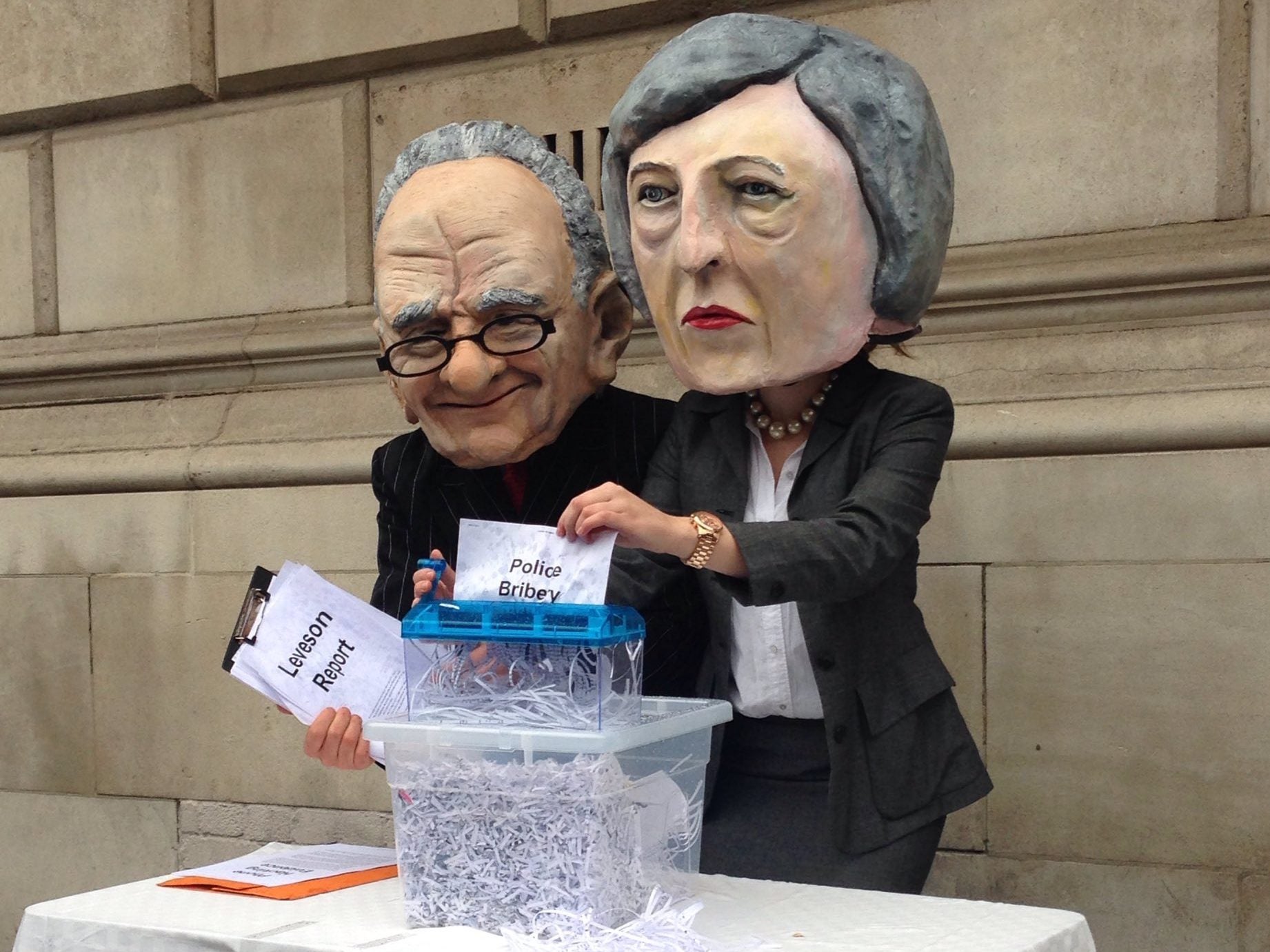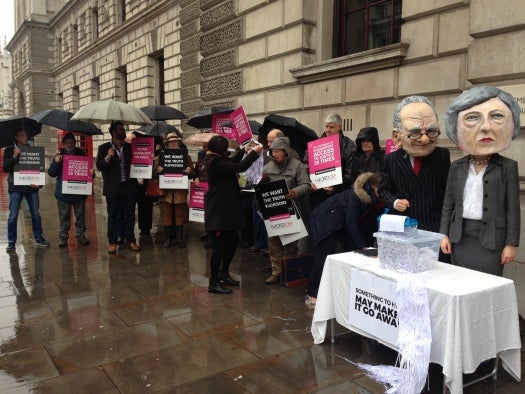
Press reform campaigners led by Hacked Off today delivered 52,000 pages of Leveson Inquiry evidence to the Department of Culture, Media and Sport as they demanded the full enactment of Section 40.
The group of around 30 victims of past press excesses and supporters of campaign groups Hacked Off and Avaaz held a brief protest at Westminster this afternoon.
They are also demanding that the second part of the Leveson Inquiry is held.
A Government consultation on whether to enact Section 40 and hold Leveson part two closes tomorrow (Tuesday) at 5pm.
Protesters from Avaaz wearing papier-mache masks of Prime Minister Theresa May and News Corp’s Rupert Murdoch shredded “evidence of corruption” at News International which they said would be examined in Leveson part two.
The group then marched down King Charles St. to deliver 52,000 pages of evidence considered in the Leveson Report to Culture Secretary Karen Bradley, chanting their demands for “truth and justice” and shouting “Rupert Murdoch, shame on you”. Bradley has previously voiced concerns over the impact of Section 40 on local journalism.
Speaking at the protest Nathan Sparkes, policy chief at Hacked Off, said: “It was agreed by all sides when the Hacking Scandal broke that the only way in which a decision on press regulation should be taken would be on an impartial basis and presided over in a public inquiry by a judge. Politicians are always by definition conflicted on the issue of press regulation.
“After Leveson considered thousands of pages worth of evidence to come to his recommendations, it’s very concerning for anyone who believes in freedom of expression, that the Government has sought to renege on following through with his recommendations that they agreed to in 2013.
“This consultation explicitly gives the Government control over whether to bring forward Section 40 or not and that’s why we are here today; to make the point that Leveson was totally unconflicted on this issue and it’s totally inappropriate and totally unacceptable for the Government to make decisions on the back of a ten-week consultation that was only called to win a few favourable headlines from the press further down the line.”

There has been widespread opposition in the press to Section 40 of the Crime and Courts Act, which, if implemented, would force UK publishers to sign up for a state-backed system of press regulation.
On press demands that Section 40 be scrapped, Dr Evan Harris, joint executive director of Hacked Off, said: “It is extraordinary that the press should be so desperate to suppress a public inquiry into corruption in the police force, but with the fact that the allegations of corruption also extend to newspaper corporations it is no surprise that many of the newspapers who would be under investigations are fighting so irrationally against it.”
If Section 40 (which was passed by Parliament in 2013) is enforced, news publishers who are not signed up to a Royal Charter-backed regulator will pay both sides costs in libel and privacy actions win or lose. Only members of Royal Charter-recognised regulator Impress would be immune.
Many UK news publishers object on principle to being part of a state-backed press regulation scheme, stating concerns that Impress is almost entirely funded (albeit indirectly) by press reform campaigner Max Mosley. In a column for the Sunday Times yesterday, Sarah Baxter highlighted Mosley’s youthful far-right leanings.
When asked if Mosley’s involvement with Impress was a concern, Sparkes said: “I don’t think we would need to make that judgement. The Press Recognition Panel (PRP) has made it. The whole point of Leveson is that it shouldn’t be up to any of us to judge whether a regulator is up to scratch or whether it is independent. The PRP were appointed specifically to make that judgement.
“It’s not up to me or you, or any of us. Only the PRP has the independence and the knowledge to make that judgement.”
The vast majority of UK newspapers and magazines have signed up to rival regulator IPSO, which is self-funded by the press. They argue that IPSO is sufficiently independent of active journalists to self-regulate the industry, and that if Section 40 were enacted investigative journalism would suffer as a result.
Hacked Off claims to have persuaded more than 5,000 people to fill out its form urging the implementation of Section 40 in full, arguing that failure go through with Leveson’s proposals would represent a betrayal of the victims of press abuse.
Alastair Morgan, whose private investigatory brother Daniel was murdered in 1987 in a case which has been mired in allegations of police corruption, said: “I want the Leveson Inquiry to take place because I want the relationship between senior News of The World journalists and the people involved with Southern Investigations to be fully investigated.
“In 2002, journalists from the News of The World placed the officer investigating my brother’s murder under surveillance. I believe that was a direct attempt to intimidate him and to upset the murder investigation.
“This was never investigated by the Metropolitan Police and the corrupt relationship between the Metropolitan Police and News International has never been fully explored.”
On Section 40, Morgan said: “People are saying that it will stop investigative journalism. If that’s true then how come Nick Davies and Sir Harry Evans, the former editor of The Sunday Times, support it? It’s only because newspapers want to continue without any kind of accountability that they are against it.”
Email pged@pressgazette.co.uk to point out mistakes, provide story tips or send in a letter for publication on our "Letters Page" blog
